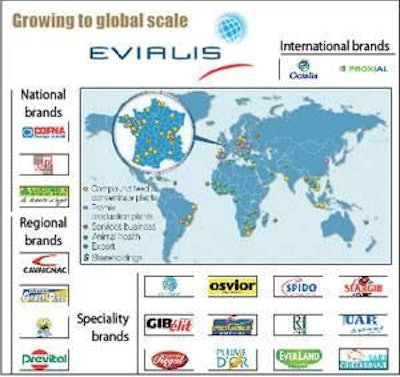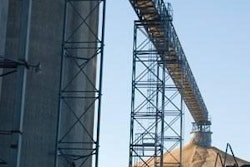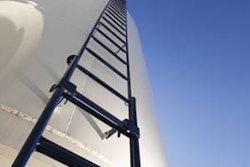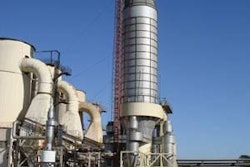
Not content with selling in 50 countries from a number of manufacturing centres, the French animal nutrition group Evialis wants to expand its network of operations around the globe. Evialis tells FEED INTERNATIONAL that it will seek acquisitions to further increase its international presence. Already the group, based in the big animal production zone of northwestern France, is among the top 20 feed manufacturers worldwide.
However, group president Pierre Lefebvre, in an exclusive FI interview also in this issue, underlined the expansionist inclinations of the group's directors. The firm view at board level seems to regard being a significant player within one country as far from the complete solution for the future. It is not even enough to be an exporter. To be truly competitive, leaders of Evialis believe, demands a network of operations in animal nutrition that extends around the world.
In the case of Evialis, this marks a clear statement of intent by an enterprise that already manufactures feed products at 52 plants in 12 countries and sells on 50 markets internationally. When the group reported its financial results for the first six months of 2006, it said that international activities had contributed 78 million or nearly a quarter to a total consolidated sales figure of 316.3 million. For the first half of 2006, this performance was up 2.8% from the turnover of 307.6 million recorded for January-June 2005. The Evialis Asian business had generated 20.3 million, boosted especially by 13.4 million from Vietnam where the group has been extending its factories in the north and south of the country. Southern and eastern Europe added 26 million between them, while Brazil put in 19.5 million and South Africa 8 million.
These results were announced at the same time as a change in the structure of the group's ownership. Equity investor BNP Paribas had previously told the Paris stockmarket that its 63.2% shareholding in Evialis was "a purely financial investment" which it intended to reduce gradually below 50% as market conditions allowed. Now BNP Paribas revealed that it had dropped its stake to 47.3% after an improvement in the trading conditions for Evialis shares.
Historically, the feed group started life over 50 years ago as family feed business Guyomarc'h in Brittany, which has become the country's leading animal production zone. In 1960, Guyomarc'h moved into poultry production and processing as an integrator and the first internationalisation came in 1968 with the opening of a Spanish base. Guyomarc'h Nutrition Animale was formed as a separate subsidiary in 1988 and this GNA entity was acquired by French banking group Paribas in 1990. A portion of its shares was first floated on the Paris stockmarket in 1996.
Re-named as Evialis in 2001, the increasingly international company specialised in commercial feed products was structured into three divisions for nutrition, international affairs, and animal health, while the French premix business and firme-services activities were merged into a subsidiary called Prisma. As a firme-services, Prisma offers both premixes and related paid services that can include analysis, nutritional consultancy, and diet formulation.
Insulation against ‘bird flu'
Analysts watching the recent statements of financial performance in the feed industry have noted an ongoing emphasis on the influence felt by a feed manufacturer's results according to its species coverage. Avian influenza continues to bedevil the feed scene in a mix of countries, Evialis had pointed out, and this in turn limits their uptake of poultry diets. By comparison, the group has gained from having a strong ruminants presence in the product mix it offers in France. Sales of its ruminant products represent about 50% of its total French turnover. Likewise, Evialis has benefited from a pigs-and-aquaculture bias in its third-largest national market, Vietnam.
The Vietnamese perspective will be reinforced by the end of 2006 through the investment programme aimed at doubling the subsidiary's overall compound feed production capacity, with even a tripling of potential output intended for fish and shrimp feeds. Porcine and aquaculture volumes at the Vietnam operation had already increased by one-third in the first three months of 2006 alone.
The downside, of course, could be seen recently in countries where Evialis relies more on providing poultry feeds. In both Indonesia and India, the trade was down, as it was in southern Europe. At home in France, the impact was felt most by the group's premix business and by the regional joint-venture called Nutréa, created in Brittany in 2005 as a partnership with farm co-operative Unicopa.
Undoubtedly, however, recent events have demonstrated how Evialis has been insulated against the worst of the ‘bird flu' risk by being active in a wide range of countries. The slogan at its headquarters near Vannes usually is translated as ‘Feed the animal well to better feed man'. A glance at the labels fixed to the world map on the office wall might suggest that the group is at least as well defined by its emblem, in which a globe stands above the name.
Putting a globe above the name
In 1988, Groupe Guyomarc'h transferred all its feed activities to animal nutrition offshoot GNA, a newly created company wholly owned by Ets Guyomarc'h SA. At that time, total feed production in France in company plants or using GNA technology was calculated to be 1.967 million tonnes. By 1991, output had reached 2.15 million tonnes at 21 French feed mills, plus 650,000 tonnes per year (tpy) made under licence and another 1 million tonnes produced abroad at five group-owned mills or by licensees. The reach of GNA by now extended in multiple directions geographicallyto Latin America (Brazil), to Africa (Ivory Coast and Cameroon), to Asia (Indonesia, already worth 280,000 tpy), and to the rest of Europe (Spain, Romania, and Poland).
The middle of the 1990s found company documents referring to the production of 2.07 million tonnes of complete feed in France and another 460,000 tonnes abroad. GNA calculated that its premixes also went into 650,000 tonnes of feed nationally and 1.63 million tonnes internationally. So, the total coverage based on its techniques added up to 4.81 million tonnes per year. Furthermore, by the mid-1990s, international activities were representing well over 20% of turnover. Soon China, Vietnam, and India had been added to the list of destinations.
Figures for the year 2000 gave a total of 5.83 million tonnes. Complete feeds accounted for about 2.36 million tonnessome 1.87 million tonnes domestically and 490,000 tonnes abroad. Premix usage was reckoned to contribute the equivalent of 1.29 million tonnes in France and 2.24 million tonnes in other countries.
Evialis in its annual report for 2005 cites around 6 million tonnes overall (‘complete feeds and reconstituted feeds' or premix-equivalent tonnage) and indicates 40% was in the form of complete feeds (see figure, ‘Feed forms'). The percentages quoted suggest slightly over 2 million tonnes in Francemaking Evialis the country's second-largest feed producerand about 430,000 tonnes elsewhere. Reconstituted feeds from premixes amounted to 1.36 million tonnes at home and nearly 2 million tonnes externally. By contrast, the volume exported was only 6%, equivalent to 370,000 tonnes.
A decade in preparation
Clearly the group has already established itself as an international operator, even before making any new acquisitions. In the 10 years since its shares were first floated on the Paris Bourse, the business has been re-defined through a series of purchases. The first of these from 1996 onwards were in Poland, Vietnam, and India. Then in 1999 came the buy-out of Cargill's feed activities in Brazil, followed soon after by moves in Portugal and South Africa. Meanwhile, Evialis strengthened its position in France as both a compounder and a firme-service.
More recently, the company has acquired 30,000 tpy South African compounds manufacturer Monty Food to add to the premix activities of the Coprex company in South Africa bought by Evialis in 2001. New western-France venture Nutréa has been started in partnership with co-operative Unicopa. Last year there was also a technology partnership agreement signed with Nosan Corporation of Japan, mainly involving alternatives to antibiotic growth promoters and feeds of low environmental impact. Nosan makes 2.4 million tpy at eight Japanese plants. So far, 2006 has seen the launch of a new investment programme in Vietnam and the establishment of an "observation deck" in the USA (see this issue's exclusive interview with Evialis CEO Pierre Lefebvre).
So Evialis has moved strongly in the direction it signalled when adopting its new name in May 2001. At the time, the company told the stockmarket that it honoured its history, dating back to the foundation of Guyomarc'h NA in the Brittany region in 1954. But the change of identity was needed to reflect where it wanted to go. "This," Evialis declared, "is a group with global ambitions."





.jpg?auto=format%2Ccompress&fit=crop&h=167&q=70&w=250)











